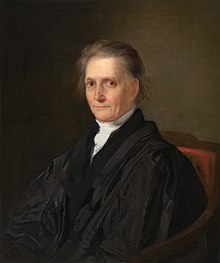It discusses the paternity of West Ford (1784/5–1863, shown here), a man of both African and European ancestry enslaved at Mount Vernon as an adolescent in the early nineteenth century. Legally freed on reaching maturity, he helped to manage the plantation and tourist spot for decades.
I remember reading about this question in the New York Times in 1999. In the wake of discoveries about the Jefferson D.N.A. haplotype, Nicholas Wade filed a story headlined “Descendants of Slave’s Son Contend That His Father Was George Washington.”
There doesn’t appear to be new evidence on the question. The link between George Washington and West Ford still appears to rest on an oral tradition passed down by descendants of two different Ford grandsons and first mentioned in print in 1940.
That’s not negligible, but it’s not as strong as the evidence about Thomas Jefferson. We have public statements about Jefferson’s enslaved children from the period of his presidency. We have a detailed 1873 statement from Madison Hemings about how he and his siblings were Jefferson’s children. That description of Sally Hemings’s family turned out to be entirely consistent with the D.N.A. findings more than a century later while other claims proved untenable.
One of the last-gasp arguments that “defenders” of Thomas Jefferson then seized on was that the father of Sally Hemings’s children was the President’s brother, Randolph Jefferson. That relied on overlooking the facts that:
- Thomas, not Randolph, owned and controlled Hemings.
- Thomas lived at Monticello with Hemings while Randolph lived on his own slave-labor plantation twenty miles away. (Not to mention Thomas and Hemings were in Paris while Randolph remained in Virginia.)
- Thomas is documented to have been at Monticello around every period when Hemings conceived children, and there is no strong evidence that Randolph visited Monticello at any of those times.
- John Augustine Washington, not his brother George, owned and controlled West Ford’s mother, Venus.
- John Augustine lived at Bushfield with Venus while George lived on his own slave-labor plantation ninety miles away.
- It’s not clear when Venus gave birth to West Ford and thus when that child was conceived, but George’s movements are well documented and there’s no strong evidence showing that he and Venus were near each other at the crucial time. (By one interpretation of the ambiguous birthdate, George was still away commanding the Continental Army.)
The West Ford descendants have pushed for D.N.A. testing of the sort that produced new evidence about Jefferson and Hemings. However, that sort of testing wouldn’t distinguish among George Washington, John Augustine Washington, or the latter’s sons.
West Ford came to Mount Vernon after George Washington died and the property passed to his nephew Bushrod, a son of John Augustine Washington.
To me it appears likely that West Ford and Supreme Court justice Bushrod Washington (1762–1829, shown here) were related in some way—probably more closely than West Ford and the late President.


No comments:
Post a Comment